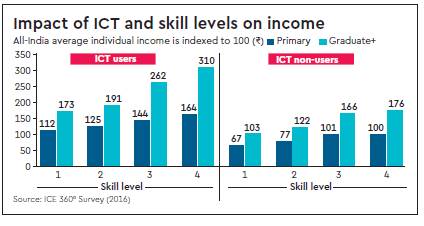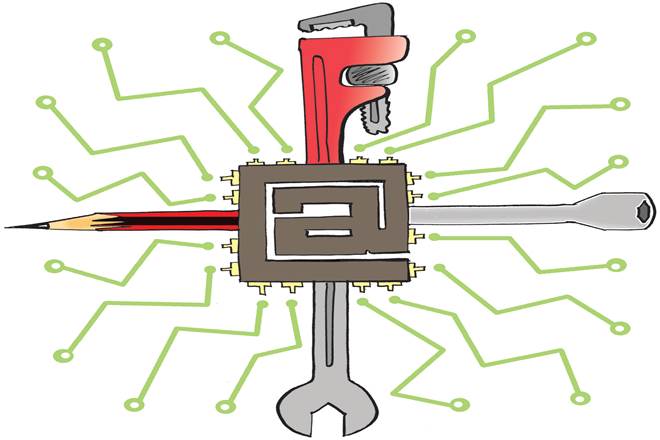By Rajesh Shukla, Megha Shree & P Geetha Rani
Digital India has become the talk of the town in recent times. The government launched the campaign to ensure that all government services are made available to citizens via improved online infrastructure and increased internet connectivity. However, digital technologies have boosted growth, expanded opportunities, and improved service delivery. Along with the larger shift to a knowledge economy, the role of ICT (information and communications technology) in development could be seen as an enabler that facilitates existing channels of economically and socially significant information flow. Inevitably, the relationships between internet usage and returns to occupation and or education have been evolved as a major area of research in the field of development studies. Various social scientists have also marked the stamp over the positive association between internet access/usage and well-being where individuals with internet access at home hold stronger ties with the economic well-being as well.
To this effect, the People Research on India’s Consumer Economy’s (PRICE) analysis of its comprehensive ICE 360° (2016) survey data—conducted in 60,360 households—provides key insights into the role of ICT in return on skills. The approach adopted here provides an alternative perspective on the quality of labour force, which depends on education, skill levels and technology. It brings out the issue with an underlying idea that ICT skills are developed through learning-by-doing.
This is enabled by internet access and frequent use, a prerequisite for participation in much of the activity in the digital economy. It further makes an effort to examine how the earnings through skills based on primary occupation get influenced over the usage of ICT.
The ICE 360° (2016) data shows that as skill levels rise, ICT usage too grows. Besides, the use of internet at the individual level also shows a positive relationship with return on skill. The internet-using individual earns more than double that of non-users. For example, if an average Indian earns `100, the ICT user earns `169, while the non-ICT user’s earning is only `80. This is evident across all skill level types. Based on this, one can argue that internet usage plays a vital role in increased earnings.
READ ALSO | Nestle expands pink KitKat range called Ruby; India not a part of new launch
The impact of the positive steps taken by the central government in ushering in digital technology in delivering services to citizens is already begun to be felt in a big way. Improvement in online infrastructure and internet connectivity are expected to boost economic growth, offer new opportunities and improve service delivery. Nearly 22.3% of the population are ICT users who are defined as those who have access to the internet and also use it for email, social networking, internet banking, shopping and accessing information related to work, entertainment, travel and other purposes.
Our findings divulge that although ICT users and non-users are distributed across all the socio-religious groups; however, ICT users primarily belong to the upper castes while non-users are characteristically the minorities.

Looking through the lens of educational qualifications, little more than three-fourths of non-ICT users have completed elementary education. This is nearly 40% in the case of ICT users. While 21% of ICT users are graduates, only 5% of non-ICT users have completed graduation. A majority of ICT users (40%) are in regular salaried employment followed by self-employment in non-agriculture (26%). By contrast, ICT non-users are mostly engaged in labour (42%), agricultural self-employment (24%), and only 15% are in salaried jobs.
Skills and ICT usage share a positive relationship. Our data reveals that nearly 8% of ICT users are at skill Level 4, which is four times more than that of non-users. On the flip side, a large majority of ICT non-users are at skill Level 1. In terms of earnings, if all individuals earn `100, then a skill Level 1 ICT user earns `136, while an ICT non-user earns just `67.
A similar pattern is observed among skill Level type 4 people: An ICT user earns `276 as against `161 for a ICT non-user. This establishes the fact that returns to ICT skills are higher than that for non-ICT. The gap between ICT users versus non-users rises with an increase in skill levels. What is interesting to note is that illiterate ICT users, across all skill level types, earn more than non-ICT users.
Deep dive analytics reveal that return to ICT skills is highly correlated with education. This can be seen from the fact that earnings of an ICT non-user graduate with skill Level 4 are almost equivalent to that of an ICT user graduate with skill Level 1. Earnings of the illiterate, as well as graduate ICT users, are more than average across all-India indexed earnings. Also, the difference between the earnings of a graduate and an illiterate is quite high among ICT users vis-à-vis ICT non-users.
Evidently, internet access is a potential enabler for high return on skills. However, mere usage alone does not indicate who are the actual gainers. To do that, let’s take a look at the frequency of ICT usage. Individuals using the internet regularly are actual gainers. For instance, if all-India internet users’ income is indexed at `100, regular users are seen to earn `108 as against `78 for the occasional users. Earnings of regular users with skill Level 4 are at `183 compared to `83 for occasional users, which is almost equivalent to the earnings of regular users with skill Level 1.
Although the links between use of ICT in access to particular skill/occupation is not discussed, yet usage of internet at individual level suggests a positive association with return on skills. Clearly, there is a high degree of compatibility with higher wages, skill levels and better education. It is clear from analyses that not everyone benefits equally from ICT usage and hence building resilience to this earning differential is crucial and also an important policy concern. There are many more nuggets and we have given you no more than a flavour.
Shukla is director & CEO and Shree is research fellow at People Research on India’s Consumer Economy (PRICE). Geetha Rani is associate professor, National University of Educational Planning and Administration (NUEPA), New Delhi

